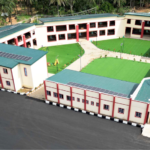- Home
- Features
- Startup Zone
- Projects
- Policies
- Shop
- Policies
- Projects
- Startup Zone
- Country Spotlight
- Analysis
- Tech
- Policies
- Projects
- Startup Zone
- Country Spotlight
- Analysis
- More
- Beyond the Kalashnikov: Africa’s Shift Toward Technology-Driven Warfare
- Afrail Express: Uniting a Continent on Rails
- AFRICA’S ENERGY CORRIDORS: CONNECTING POWER, PEOPLE, AND PROSPERITY
- Startup Lions Campus: Empowering Kenya’s Digital Generation
- L’Art de Vivre’s Le Paradis de Mahdia: Tunisia’s Model for Sustainable Luxury
- The Lobito Corridor: Rewiring Africa’s Trade Arteries Through Strategic Infrastructure
- AFRICA’S GREEN ENERGY TRANSITION: A BEACON OF HOPE FOR CLIMATE ACTION
- Dangote Refinery: Showcasing Africa’s Project Success Story
- AFRICA GREEN ECONOMY: ALL YOU NEED TO KNOW
- The Most Important Amicus Brief in the History of the World
- The Rise of Indigenous UAVs: Africa’s Drone Capabilities in Warfare and Surveillance
- AFRICA’S LARGEST OIL PRODUCERS: A COMPREHENSIVE OVERVIEW
- Beyond the Kalashnikov: Africa’s Shift Toward Technology-Driven Warfare
- Afrail Express: Uniting a Continent on Rails
- AFRICA’S ENERGY CORRIDORS: CONNECTING POWER, PEOPLE, AND PROSPERITY
- Startup Lions Campus: Empowering Kenya’s Digital Generation
- L’Art de Vivre’s Le Paradis de Mahdia: Tunisia’s Model for Sustainable Luxury
- The Lobito Corridor: Rewiring Africa’s Trade Arteries Through Strategic Infrastructure
- AFRICA’S GREEN ENERGY TRANSITION: A BEACON OF HOPE FOR CLIMATE ACTION
- Dangote Refinery: Showcasing Africa’s Project Success Story
- AFRICA GREEN ECONOMY: ALL YOU NEED TO KNOW
- The Most Important Amicus Brief in the History of the World
- The Rise of Indigenous UAVs: Africa’s Drone Capabilities in Warfare and Surveillance
- AFRICA’S LARGEST OIL PRODUCERS: A COMPREHENSIVE OVERVIEW
- Beyond the Kalashnikov: Africa’s Shift Toward Technology-Driven Warfare
- Afrail Express: Uniting a Continent on Rails
- AFRICA’S ENERGY CORRIDORS: CONNECTING POWER, PEOPLE, AND PROSPERITY
- Startup Lions Campus: Empowering Kenya’s Digital Generation
- L’Art de Vivre’s Le Paradis de Mahdia: Tunisia’s Model for Sustainable Luxury
- The Lobito Corridor: Rewiring Africa’s Trade Arteries Through Strategic Infrastructure
- Startup Zone
Top Insights
Tech That Builds: How Digital Twins, Drones, And Ai Are Revolutionising Project Delivery
The future of infrastructure development in Africa looks promising, with digital twins, drones, and AI set to play a critical role.

The African continent is witnessing a significant transformation in its infrastructure development landscape, driven by the adoption of cutting-edge technologies such as digital twins, drones, and artificial intelligence (AI). These technologies are revolutionizing project delivery, enhancing efficiency, and promoting transparency in African infrastructure projects.
DIGITAL TWINS: A GAME-CHANGER FOR INFRASTRUCTURE DEVELOPMENT
Digital twins are virtual replicas of physical infrastructure, allowing for real-time monitoring, simulation, and analysis. This technology has the potential to transform infrastructure development by enabling more efficient project planning, execution, and maintenance. Digital twins can help identify potential issues before they arise, reducing the risk of costly delays and improving overall project outcomes. By creating a digital replica of infrastructure, stakeholders can test and simulate different scenarios, optimizing design and operations.
The benefits of digital twins in infrastructure development are numerous. They can enhance collaboration among stakeholders, improve data management, and reduce costs. Digital twins can also help extend the lifespan of infrastructure, improve maintenance, and reduce downtime. With the increasing complexity of infrastructure projects, digital twins offer a powerful tool for managing and optimizing infrastructure development. By leveraging digital twins, infrastructure developers can make more informed decisions, reduce risks, and improve project outcomes.
The adoption of digital twins in infrastructure development is expected to grow rapidly in the coming years. As the technology continues to evolve, we can expect to see more sophisticated digital twins that integrate with other technologies, such as artificial intelligence and the Internet of Things (IoT). With its potential to transform infrastructure development, digital twins are set to play a critical role in shaping the future of infrastructure projects. By harnessing the power of digital twins, infrastructure developers can create more efficient, sustainable, and resilient infrastructure that meets the needs of communities and economies.
DRONES: ENHANCING SITE SURVEYING AND MONITORING
Drones are increasingly being used in infrastructure projects to enhance site surveying and monitoring. Equipped with high-resolution cameras and sensors, drones can capture detailed images and data, allowing for more accurate site assessments and monitoring. This technology can help reduce costs, improve safety, and enhance project efficiency. Drones can also provide real-time data, enabling stakeholders to track project progress and identify potential issues before they arise.
The use of drones in site surveying and monitoring offers several benefits. They can capture data from hard-to-reach areas, reducing the need for manual surveys and improving the accuracy of data collection. Drones can also monitor site conditions, track progress, and detect potential issues, enabling stakeholders to take corrective action. By leveraging drones, infrastructure developers can improve the efficiency and effectiveness of site surveying and monitoring, reducing costs and improving project outcomes.
The adoption of drones in infrastructure projects is expected to continue growing, driven by advances in technology and the increasing demand for efficient and cost-effective solutions. With their ability to capture detailed data and provide real-time insights, drones are set to play a critical role in shaping the future of infrastructure development. By leveraging drones, infrastructure developers can improve project efficiency, reduce costs, and enhance safety, ultimately delivering better infrastructure that meets the needs of communities and economies.
ARTIFICIAL INTELLIGENCE: UNLOCKING INSIGHTS AND OPTIMIZING PROJECT DELIVERY
Artificial intelligence (AI) is revolutionizing the way infrastructure projects are delivered, enabling stakeholders to unlock valuable insights and optimize project outcomes. AI algorithms can analyze large datasets, identify patterns, and provide predictive analytics, helping infrastructure developers make more informed decisions. By leveraging AI, project managers can predict potential delays, identify areas for improvement, and optimize resource allocation, ultimately reducing costs and improving project efficiency.
The use of AI in infrastructure project delivery offers several benefits, including improved predictive maintenance, enhanced quality control, and optimized resource allocation. AI-powered predictive analytics can help identify potential issues before they arise, enabling stakeholders to take proactive measures to prevent costly delays and repairs. Additionally, AI can help optimize resource allocation, reducing waste and improving project efficiency. By leveraging AI, infrastructure developers can improve project outcomes, reduce costs, and enhance the overall quality of infrastructure.
The adoption of AI in infrastructure project delivery is expected to continue growing, driven by advances in machine learning and data analytics. As AI technology continues to evolve, we can expect to see more sophisticated applications of AI in infrastructure development, including the use of machine learning algorithms to predict project outcomes and optimize project delivery. By leveraging AI, infrastructure developers can unlock new insights, optimize project delivery, and create more efficient, sustainable, and resilient infrastructure that meets the needs of communities and economies.
STARTUPS AND INNOVATION
The adoption of digital twins, drones, and AI in African infrastructure projects is driven by a growing ecosystem of startups and innovators. These companies are developing cutting-edge solutions that cater to the specific needs of African infrastructure projects, enhancing efficiency, transparency, and sustainability.
ENHANCING EFFICIENCY AND TRANSPARENCY
The use of digital twins, drones, and AI in African infrastructure projects is enhancing efficiency and transparency in several ways. These technologies can help reduce costs, improve project outcomes, and promote accountability. By providing real-time insights and data, these technologies can also help stakeholders make informed decisions and track project progress.
CASE STUDIES: SUCCESS STORIES FROM AFRICA
Several African countries are already leveraging digital twins, drones, and AI to enhance infrastructure development. For example, South Africa’s construction industry is using drones to improve site surveying and monitoring, while Kenya’s transport sector is leveraging AI to optimize traffic management. These success stories demonstrate the potential of these technologies to transform infrastructure development in Africa.
While digital twins, drones, and AI offer significant opportunities for African infrastructure projects, there are also challenges to be addressed. These include issues related to data quality, infrastructure, and regulatory frameworks. However, with careful planning and implementation, these challenges can be overcome, and the benefits of these technologies can be fully realized.
Infrastructure development is critical to Africa’s economic growth and development. The continent’s infrastructure deficit is significant, with many countries lacking adequate roads, bridges, and other critical infrastructure. Digital twins, drones, and AI can help address this challenge by enhancing the efficiency and effectiveness of infrastructure projects.
THE FUTURE OF INFRASTRUCTURE DEVELOPMENT
The future of infrastructure development in Africa looks promising, with digital twins, drones, and AI set to play a critical role. These technologies will continue to evolve, offering new opportunities for infrastructure development and project delivery. As the adoption of these technologies increases, we can expect to see more efficient, transparent, and sustainable infrastructure projects across the continent.
Arguably the most efficient solution to human problems in the 21st century, digital twins, drones, and AI are revolutionizing project delivery in African infrastructure projects. These technologies offer significant opportunities for enhancing efficiency, transparency, and sustainability. As the adoption of these technologies increases, there are high chances of more successful infrastructure projects across the continent, driving economic growth and development.
UNLOCKING AFRICA’S POTENTIAL
The potential of digital twins, drones, and AI to transform infrastructure development in Africa is significant. By leveraging these technologies, African countries can unlock new opportunities for economic growth and development. As the continent continues to invest in infrastructure development, the use of these technologies will be critical to delivering successful projects that meet the needs of African
Recent Posts
Related Articles
Emerging Oil & Gas Processing Hubs Reshaping African Economies
The African Continental Free Trade Area (AfCFTA) is reshaping how Africa leverages...
ByafricaprojectJanuary 6, 2026Smart Farming & AgriTech: Transforming Africa’s Agricultural Future
Agriculture remains central to Africa’s economic and social fabric, employing over 60...
ByafricaprojectJanuary 5, 2026Africa’s Fastest-Growing Tech Parks and the Innovators Behind Them
Across Africa, purpose-built technology parks are evolving from experimental initiatives into central...
ByafricaprojectJanuary 2, 2026Emerging Oil & Gas Processing Hubs Reshaping African Economies
The African Continental Free Trade Area (AfCFTA) is reshaping how Africa leverages...
ByafricaprojectDecember 30, 2025









